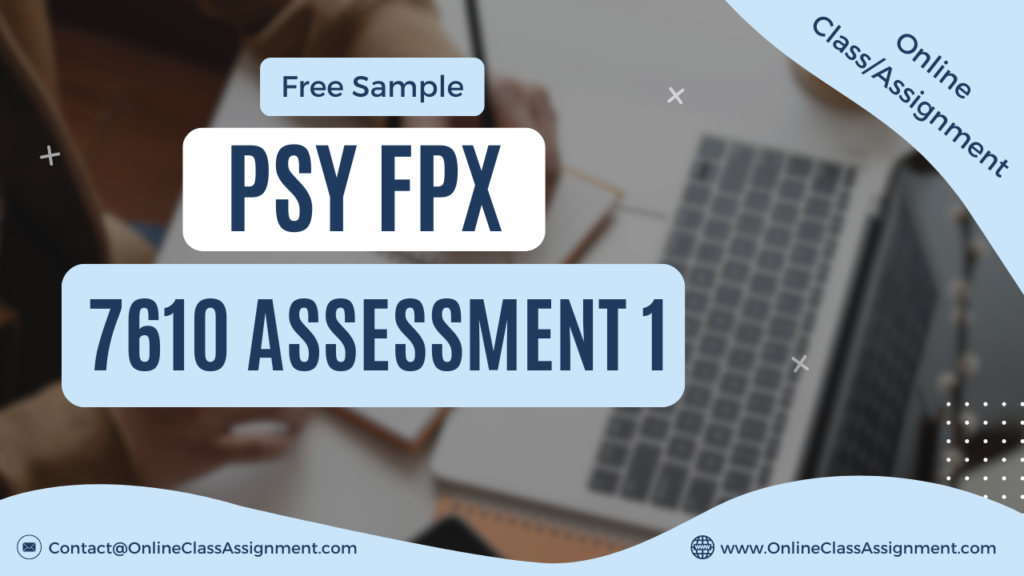PSY FPX 7610 Assessment 1 Evaluation of Test Purpose, Population, and Training for Three Tests

PSY FPX 7610 Assessment 1 Evaluation of Test Purpose, Population, and Training for Three Tests
Student Name
Capella University
PSY FPX 7610 Tests and Measurements
Prof. Name
Date
Introduction
In the field of Applied Behavior Analysis (ABA), behavior analytic skill assessments are widely used, particularly in assessing children diagnosed with autism spectrum disorder (ASD). As a Registered Behavior Technician (RBT), three assessments have become familiar: Verbal Behavior Milestone Assessment and Placement Program (VBMAPP), Assessment of Basic Language and Learning Skills, Revised (ABLLS-R), and Motivation Assessment Scale (MAS). These assessments play crucial roles in therapy intake and continuation.
Verbal Behavior Milestone Assessment and Placement Program (VBMAPP)
VBMAPP assesses verbal behavior deficits in children with ASD and tracks progress over therapy. It consists of five components, divided into three developmental levels. Level 1 assesses early mand, tact, listener, social, visual-perceptual, match-to-sample, independent play, motor imitation, echoic skills, and spontaneous vocal behavior. Level 2 expands on these skills and includes evaluation of listener responding, intraverbals, classroom/group routines, and linguistic skills. Level 3 assesses pre-academic behaviors. VBMAPP is utilized in clinical and educational settings to establish language goals (Barnes et al., 2014; Holland, 2017).
Assessment of Basic Language and Learning Skills-Revised (ABLLS-R)
ABLLS-R is a criterion-referenced assessment and curriculum guide focusing on language, social, academic, daily living, and motor skills development in children with ASD or language delays aged 3 to 9. Despite its popularity, ABLLS-R lacks empirical support for its psychometric properties (Partington et al., 2016; Rispoli, 2014).
PSY FPX 7610 Assessment 1 Evaluation of Test Purpose, Population, and Training for Three Tests
Motivation Assessment Scale (MAS)
MAS aids language development and addresses problem behaviors by understanding motivation, guiding interventions to enhance communication effectiveness. MAS is suitable for individuals with developmental delays and language impairments (Monaco & Associates).
Normative Sample, Sampling Procedures, and Intended Population
VBMAPP and ABLLS-R are criterion-referenced assessments without normative samples, focusing on individual progress rather than group comparisons. VBMAPP targets children up to two years old, while ABLLS-R focuses on children aged 3 to 9 with ASD or language delays. MAS serves individuals with developmental delays and language impairments.
Test-User Knowledge, Skills, and Training
Proficiency in administering these assessments is essential. VBMAPP requires familiarity with verbal behavior principles, while ABLLS-R can be administered by parents, teachers, or therapists. MAS is relatively easy to conduct and interpret, suitable for therapists, teachers, and others with minimal training (Barnes et al., 2014; Rispoli, 2014).
Comparisons and Contrasts of the Three Tests
VBMAPP and ABLLS-R focus on verbal behavior but differ in their approach to progress assessment. MAS emphasizes understanding behavior motivation. VBMAPP is preferred for its comprehensive components in assessing children and ensuring appropriate service provision.
References
Barnes, C. S., Mellor, J. R., & Rehfeldt, R. A. (2014). Implementing the Verbal Behavior Milestones Assessment and Placement Program (VB-MAPP): Teaching Assessment Techniques. The Analysis of Verbal Behavior, 30(1), 36–47. https://doi.org/10.1007/s40616-013-0004-5
Holland, B. (2017, February 9). What is the VB-MAPP & How is it used in Pediatric ABA Therapy? Chicago ABA Therapy. https://chicagoabatherapy.com/articles/what-is-the-vbmapp-how-is-it-used-in-pediatric-aba-therapy/
Motivation Assessment Scale. (n.d.). Monaco & Associates. https://www.monacoassociates.com/motivation-assessment-scale
Partington, J. W., Bailey, A., & Partington, S. W. (2016). A Pilot Study Examining Test–Retest and Internal Consistency Reliability of the ABLLS-R. Journal of Psychoeducational Assessment, 36(4), 405–410. https://doi.org/10.1177/0734282916678348
PSY FPX 7610 Assessment 1 Evaluation of Test Purpose, Population, and Training for Three Tests
Rispoli, M. J. (2014). Assessment of Basic Language and Learning Skills-Revised (ABLLSR). Encyclopedia of Special Education. https://doi.org/10.1002/9781118660584.ese0197
Get Capella University Free MS Psychology Samples
PSY FPX 5002
PSY FPX 6710
- PSY FPX 6710 Assessment 6 Training Evaluation
- PSY FPX 6710 Assessment 5 Virtual Excellence
- PSY FPX 6710 Assessment 4 Intervention Proposal to Address
- PSY FPX 6710 Assessment 3 East Assignment Coaching Plan
- PSY FPX 6710 Assessment 2 Proposal for Conducting Candidate Screens
- PSY FPX 6710 Assessment 1 I/O Scholar Practice Gap
PSY FPX 5110
PSY FPX 6720
- PSY FPX 6720 Assessment 6 Human Resources Strategic Plan for Leadership Development
- PSY FPX 6720 Assessment 5 Critical Analysis of Leadership Theories
- PSY FPX 6720 Assessment 4 Leader Development
- PSY FPX 6720 Assessment 3 Self-Leadership
- PSY FPX 6720 Assessment 2 The Importance of Leadership and Diversity
- PSY FPX 6720 Assessment 1 The Importance of Leader Values, Traits, and Context
PSY FPX 6730
- PSY FPX 6730 Assessment 6 Growth and Development
- PSY FPX 6730 Assessment 5 Case Study: Implementation
- PSY FPX 6730 Assessment 4 Theoretical Foundations
- PSY FPX 6730 Assessment 3 Consultation Discovery Process
- PSY FPX 6730 Assessment 2 Entry and Contracting: A Case Study Description
- PSY FPX 6730 Assessment 1 Entry and Contracting: Analysis of ABC Bank
PSY FPX 6740
- PSY FPX 6740 Assessment 5 Ethical and Legal Aspects of I-O Psychology
- PSY FPX 6740 Assessment 4 Planning
- PSY FPX 6740 Assessment 3 Human Resource Development and Training, A Case Study
- PSY FPX 6740 Assessment 2 Values and Diversity
- PSY FPX 6740 Assessment 1 Psychological Foundations in Human Resources and Personnel
PSY FPX 7610
PSY FPX 6O15
